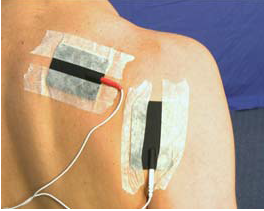AIM:
To prevent shoulder subluxation using electrical stimulation
Rationale:
Transcutaneous electrical stimulation (an electrical current applied across the skin
to stimulate nerve and muscle) is used to activate the shoulder muscle groups in order to prevent shoulder subluxation.
Equipment:
- Chair
- Electrical stimulation machine and electrodes
- Conducting gel, “Micropore” tape, alcohol wipes (not shown in video)
Key Points:
- Patient in sitting, arm supported in lap
- Therapist applies electrodes (not shown in video):
- uses alcohol wipes to wash the skin over both the supraspinatus and posterior deltoid flexor muscle belly
- evenly applies gel to electrodes
- securely tapes one electrode onto the belly of supraspinatus and one electrode onto the muscle belly of posterior deltoid (electrodes should be as far apart as is feasible)
- Ensure electrodes are not placed transthoracically or on the head/neck
- Ensure the 2 electrodes are close but not touching each other
- Therapist sets machine parameters to: current type= AC, frequency= 35 Hz, pulse duration= 100–1000 us, duty cycle (on: off time)= 10:12 s to 30: 2 s, ramp= 2 s on and off, treatment time= 1.5 to 6 hrs
- Machine may be set up as either single or dual-channel: if dual-channel, mode= SIM (simultaneous)/ SYNC (synchronous)- depending on machine (not shown in video)
- Ensure therapist provides information and warning appropriate for electrical stimulation treatment
- Ensure intensity is increased while ES is in the “on cycle”
Common Errors:
- Therapist does not increase intensity during the “on cycle”
- Therapist uses too much or too little conducting gel
- Therapist does not tape electrodes securely
Progression and Variety:
- Not applicable

